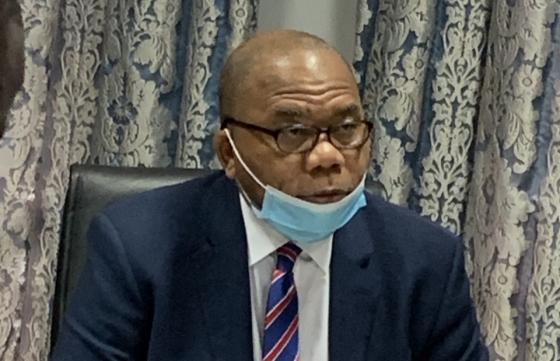Liberia: Senate Eyes Monrovia Expansion

President Pro Tempore of the Liberian Senate, Albert Tugbe Chie
The Senate is expected to use its recall session to debate among other priority legislation including the legal expansion of the nation’s capital, Monrovia.
Such an expansion, as announced by Senate Pro-tempore Albert Chie, would see Monrovia going beyond its original map and recognizing several suburbs in Montserrado as legally part of the nation's capital.
Monrovia, which was founded in 1822, comprises several settlements that spread across the Mesurado peninsula. Unofficially, since the end of the country’s 14 years of civil war, suburbs outside of Monrovia have been recognized as part of the capital city — called greater Monrovia.
But, for political reasons, the Senate is eying an amendment to the country’s Elections Law that will allow political parties to have their headquarters in Monrovia or in any one of the suburbs outside of it as a means of reducing the cost of the rent.
“The proposed amendment to be considered will redefine the country’s capital, into a broader scope. So we at the Senate will define Monrovia in a broader scope. It will be Monrovia itself but also Greater Monrovia. This includes Congo Town, Bushrod Island, Gardnersville, Paynesville, and others,” Chie said.
“The proposed change will be a great help for many political parties who are struggling to settle rental payments in the capital. Some parties have been evicted from their headquarters due to failure to meet up with exorbitant rental fees for buildings in the Capital.”
“When the law is amended, instead of political parties paying US$60,000 as rental fees in Monrovia, some will now move in the suburbs to pay as low as US$3,000 or US$2,000 annually as rental fees,” the Pro-tem said, speaking from his constituency, Grand Kru County.
The Senate Pro-tem’s disclosure comes as many political parties, including the ruling party, of which he is a member, violate Article 79(c) of the Liberian Constitution, which mandates all political parties to have their headquarters in the country’s capital, Monrovia.
The governing Coalition for Democratic Change and the majority of other political parties have their headquarters outside of the capital in complete violation of Article 79(c).
The former ruling Unity Party, before relocating to the capital, was also in violation of Article 79(c) as its previous headquarters were in Congo Town.
The Senate is returning to this special session after being recalled by President George Weah to act on some legislation of national concern.
President Weah, in the proclamation, indicated that it was a matter of national urgency that the Lawmakers return to session, noting that there still exist some time-bound critical national issues which must be resolved as a matter of urgency, and cannot wait for the return of the Legislature in October 2022.
The Senate had earlier closed for its second quarterly break to resume in October 2022 but had to cut short its break, in accordance with Article 32(b) of the 1986 Constitution. Article 32(b) provides that the President of Liberia has the prerogative to issue a proclamation calling for a special or extraordinary session of the Legislature.
The President in his proclamation mentioned the appointment of a new Chief Justice, setting of a new Census date, the passage of the amendments to the new Elections Law, and ratification and passage of other significant instruments pending before the Legislature, especially agreements of economic nature as instruments to be considered.
Based on the importance of the proclamation and its expediency, the Senate is expected to have daily deliberations beginning August 16, which is the continuation of the 5th Session so as to handle the above-mentioned legislations in a timely manner.
Meanwhile, the Chie has revealed that the Senate, among other things, would consider passing its own version of the election law.
Chie’s remark comes after the House had earlier voted to amend Section 4.5 of the 1986 election law which set aside an exclusive 30% for women representation in every political party during the submission of candidates to the National Elections Commission (NEC).
Section 4.5 (1d) of the Elections Law Amendment Act also called for a Political Party or Coalition to have at least one woman contestant for every primary at a convention for each constituency.
But for Chie, the Senate will ensure that the process is voluntary and not mandatory.
“At the Senate, we initially agreed, but when we started reviewing the law, we realized that Article 79(a) will put some constraints that will not allow us to make it compulsory” he averred. “The Senate will make it voluntary so that political parties will endeavor for 30 to 40 percent of electable candidates to be women.”
In time past, other Senators have complaint that the House amendments violate Article 18 of the Liberian constitution which says: “All Liberian citizens shall have equal opportunity for work and employment regardless of sex, creed, religion, ethnic background, place of origin or political affiliation, and all shall be entitled to equal pay for equal work.”
Also, the Senator will be considering whether to concur with some amendments to the election law by the House, which critics say muzzle Liberia’s fragile democracy.
The House’s action, which will not affect incumbents, but rather aspiring ones, will astronomically increase candidates’ registration fees for the post of President, Vice President, Representatives, and Senators.
The House amendment of Section 7.3 (2), which deals with the application and double fees, removes the modest amount that enables many of them to register and contest for public office over the last two decades.
As per the House amendment, US$5,000; US$3,000 for the Vice President position, while Senate is US$1,500 and Representative US$1,000.00
This is against the previous fee of US$2,500 as registration fees for the president; US$1,500.00 for the Vice President; US$750.00 for Senators; and US$500.00 for the House of Representatives.
